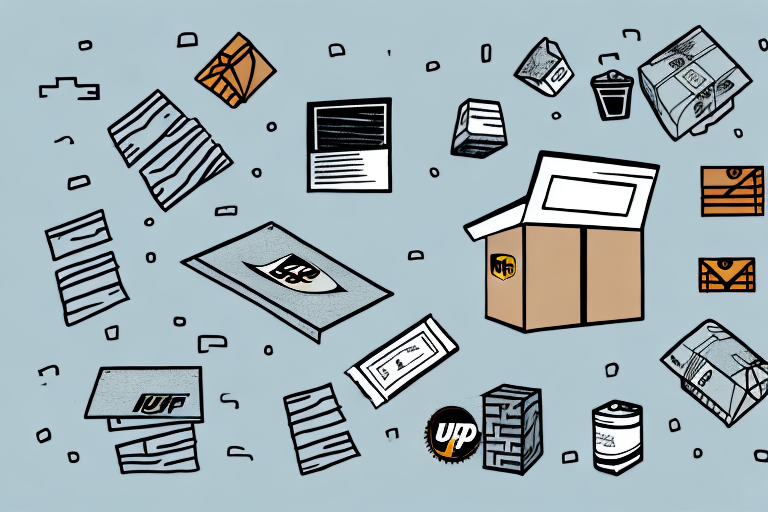If you're shipping books, CDs, or other media, you may have heard of Media Mail. It's a cost-effective way to send these types of items, but what about insurance? Can Media Mail be insured? The short answer is yes, it can. But there are some important things to know about Media Mail insurance before you ship.
What is Media Mail and Why It's Important to Know About Insurance
Media Mail is a service offered by the United States Postal Service (USPS) that allows individuals and businesses to send books, sound recordings, recorded video tapes, printed music, and other media items at a lower cost than other shipping options. However, Media Mail is not automatically insured. If you're sending valuable items, or if you want peace of mind knowing your shipment is protected in case of loss or damage, you'll need to purchase insurance.
It's important to note that not all items are eligible for Media Mail. The USPS has strict guidelines on what can be sent using this service, and items that do not meet the criteria may be returned to the sender or subject to additional fees. Additionally, Media Mail can take longer to arrive than other shipping options, so it's important to plan accordingly if you're using this service.
When purchasing insurance for your Media Mail shipment, it's important to accurately declare the value of the items being sent. This will ensure that you are adequately covered in case of loss or damage. It's also a good idea to package your items securely to minimize the risk of damage during transit. By taking these precautions, you can ensure that your Media Mail shipment arrives safely and securely.
The Benefits of Media Mail and Why Insurance Matters
One of the main benefits of using Media Mail is cost savings, especially if you're shipping heavy or bulky items. Adding insurance to your shipment may increase the cost slightly, but it can provide valuable protection for your items while they're in transit.
Another benefit of using Media Mail is that it is specifically designed for shipping educational materials, such as books, films, and other media. This means that you can take advantage of lower rates and faster delivery times for these types of items.
However, it's important to note that Media Mail does have some restrictions on what can be shipped. For example, you cannot ship any advertising materials or computer drives using this service. Additionally, if your package is lost or damaged during transit, insurance can help cover the cost of replacing your items and ensure that you're not left out of pocket.
Understanding How Media Mail Insurance Works
To insure your Media Mail shipment, you'll need to purchase insurance through the USPS or a third-party shipping insurance provider. The cost of insurance will depend on the value of your items, and there may be a minimum insurance amount required for certain types of media, such as vinyl records.
It's important to note that Media Mail insurance only covers the cost of the items being shipped, not the cost of shipping itself. Additionally, if your package is lost or damaged during transit, you'll need to file a claim with the USPS or your insurance provider in order to receive compensation.
When purchasing Media Mail insurance, be sure to accurately declare the value of your items. If you undervalue your shipment, you may not receive full compensation in the event of loss or damage. On the other hand, if you overvalue your shipment, you may end up paying more for insurance than necessary.
How to Determine the Value of Your Shipment for Media Mail Insurance
It's important to accurately determine the value of your shipment when purchasing insurance. This will ensure you're adequately covered in case of loss or damage. If you're selling items online, the sale price may be a good indicator of value. You can also research similar items to determine their market value.
Another factor to consider when determining the value of your shipment is the condition of the items being shipped. If the items are brand new and in their original packaging, they may be worth more than if they are used or damaged. Additionally, if the items are rare or collectible, they may have a higher value than similar items that are more common. It's important to take all of these factors into account when determining the value of your shipment for media mail insurance.
Common Exclusions and Limitations to Media Mail Insurance Coverage
It's important to note that there are some exclusions and limitations to Media Mail insurance coverage. For example, Media Mail insurance does not cover damage caused by improper packaging, or damage to items with insufficient packaging. It also does not cover items shipped in envelopes or other non-rigid containers. Additionally, Media Mail insurance coverage is limited to a maximum of $5,000 per package.
Another important exclusion to note is that Media Mail insurance does not cover loss or damage caused by natural disasters, such as floods, earthquakes, or hurricanes. If you are shipping valuable items, it's recommended to purchase additional insurance coverage to protect against these types of events.
It's also worth mentioning that Media Mail insurance coverage is only available for certain types of media, such as books, CDs, DVDs, and other educational materials. If you are shipping items that do not fall under these categories, you may need to consider alternative shipping methods or insurance options.
Tips for Filing a Successful Media Mail Insurance Claim
If your Media Mail shipment is lost or damaged, filing a claim can help you recoup your losses. To increase your chances of filing a successful claim, be sure to keep all shipping receipts and documentation, take photos of the damage, and provide a detailed description of the items and their value. You'll also need to file your claim within a certain time frame, typically within 60 days of the shipment date.
It's important to note that not all items are eligible for Media Mail insurance coverage. Items such as video games, computer drives, and digital drives are not covered under Media Mail insurance. Additionally, Media Mail insurance only covers up to $5,000 in value, so if your shipment is worth more than that, you may need to consider purchasing additional insurance or using a different shipping method.
How to Purchase Insurance for Your Media Mail Shipment
You can purchase Media Mail insurance directly through the USPS when you drop off your shipment, or online through the USPS website. You can also purchase insurance through third-party shipping insurance providers, which may offer better rates or additional coverage options.
It is important to note that the amount of insurance coverage you can purchase for Media Mail shipments is limited. The maximum coverage amount is $5,000 for domestic shipments and $2,500 for international shipments. If your shipment is worth more than the maximum coverage amount, you may need to consider using a different shipping method or purchasing additional insurance through a third-party provider.
Comparing Different Types of Shipping Insurance
When choosing shipping insurance, it's important to compare different types of coverage to determine which is right for you. Some providers may offer higher coverage limits, lower deductibles, or other benefits. It's also important to read the fine print of any insurance policy to ensure you understand the coverage and any exclusions or limitations.
One type of shipping insurance to consider is carrier liability insurance, which is typically provided by the shipping carrier. This type of insurance may have lower coverage limits and higher deductibles, but it can be a cost-effective option for low-value shipments. Another option is third-party shipping insurance, which is offered by independent insurance providers. This type of insurance may offer higher coverage limits and lower deductibles, but it can also be more expensive. Ultimately, the type of shipping insurance you choose will depend on your specific needs and budget.
What Happens if Your Media Mail Shipment is Lost or Damaged?
If your Media Mail shipment is lost or damaged, you can file a claim for reimbursement with the USPS or your shipping insurance provider. If your claim is approved, you'll generally receive reimbursement for the actual value of the items, up to the maximum coverage limit of your policy.
It's important to note that the process of filing a claim can take some time, and you may be required to provide documentation such as receipts or proof of value for the items in your shipment. Additionally, if you did not purchase shipping insurance, you may only be eligible for limited reimbursement from the USPS. To avoid the hassle of filing a claim, it's always a good idea to properly package and label your Media Mail shipment, and consider purchasing additional insurance if the items are particularly valuable.
The Cost of Media Mail vs Other Shipping Options with Insurance
When deciding whether to use Media Mail or another shipping option with insurance, it's important to compare costs. While Media Mail may be cheaper than other options, the cost of insurance can add up. It's also important to consider the value of your items and the risk of loss or damage during shipping.
Another factor to consider when choosing a shipping option is the delivery time. Media Mail is known for its slower delivery times, which may not be ideal if you need your items to arrive quickly. Other shipping options, such as Priority Mail or UPS, may offer faster delivery times but at a higher cost.
It's also important to note that some items are not eligible for Media Mail, such as magazines with advertisements or books containing advertising. In these cases, you may need to use a different shipping option, which could affect the overall cost and delivery time.
Tips for Packing Your Media Mail Shipment to Minimize Damage
Proper packaging can help minimize the risk of damage to your Media Mail shipment. Be sure to use sturdy boxes or padded envelopes, and pack items tightly to prevent shifting during transit. You can also use bubble wrap or other cushioning materials to further protect your items.
In conclusion, Media Mail can be insured, but it's important to understand the limitations and necessary steps for insuring your shipment. By taking the time to properly value your items, purchase insurance, and pack your shipment securely, you can help ensure your items arrive at their destination safely and intact.
Another important tip for packing your Media Mail shipment is to avoid overpacking. While it may be tempting to fit as many items as possible into one box, this can actually increase the risk of damage during transit. Overpacked boxes are more likely to burst or become damaged, which can result in lost or damaged items.
Additionally, it's important to label your shipment clearly and accurately. This can help ensure that your package is handled properly and delivered to the correct destination. Be sure to include both the sender and recipient's address, as well as any necessary tracking or delivery confirmation information.



















